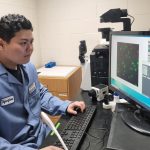Hopkins Engineers Join $45M Project to develop sense-and-Respond Cancer Implant Technology

Johns Hopkins engineers will join a national research project to rapidly develop sense-and-respond implant technology that could slash U.S. cancer-related deaths by more than 50%.
The $45 million award to 10 teams of researchers from seven states will fast-track the development and testing of a first-of-its-kind approach to cancer treatment that aims to dramatically improve immunotherapy outcomes for patients with ovarian, pancreatic, and other difficult-to-treat cancers.
The Johns Hopkins project team will be led by Jamie Spangler, the William R. Brody Faculty Scholar and an assistant professor of biomedical engineering and chemical and biomolecular engineering at the Whiting School of Engineering. The project is funded by the Advanced Research Projects Agency for Health (ARPA-H), a new federal funding agency established in 2022 to support research that has “the potential to transform entire areas of medicine and health.”
“The Spangler Lab is excited to contribute our protein engineering expertise to this innovative and interdisciplinary research program,” said Spangler. “I am honored to be part of this synergistic team that will pioneer a game-changing bioelectronic platform for cancer immunotherapy.”
The project team includes 19 co-PIs from Johns Hopkins University, University of Texas MD Anderson Cancer Center, Georgia Institute of Technology, Stanford University, Carnegie Mellon University, Northwestern University, the University of Houston, the Chicago-based startup CellTrans, and New York City-based Bruder Consulting and Venture Group.
The team includes engineers, physicians, and multidisciplinary specialists in synthetic biology, materials science, immunology, oncology, electrical engineering, artificial intelligence, and other fields. The project and team are named THOR, an acronym for “targeted hybrid oncotherapeutic regulation.”
THOR’s proposed implant, or “hybrid advanced molecular manufacturing regulator,” goes by the acronym HAMMR. HAMMR is a small bioelectronic device that can be implanted in patients to continuously monitor their cancer and adjust their immunotherapy dose in real time. This kind of ‘closed-loop therapy’ has been used for managing diabetes, where a glucose monitor continuously talks to an insulin pump.
THOR researchers say the technology can offer a potential breakthrough in treating peritoneal cancers that affect the pancreas, liver, lungs, and other organs.
The Spangler Lab’s specific role will be to design novel immune proteins—like cytokines, growth factors, and antibodies—that will be delivered to the patient via the HAMMR platform. Equipped with customized molecular features, the engineered proteins will enhance the immune system’s ability to kill cancer cells. The HAMMR platform senses and monitors protein levels, releasing cancer-fighting proteins as needed.
“Overall, our contributions will be important for the multiscale nature of this next-generation bioelectronic device. This is a project that will move the field forward to improve cell-based therapies against cancer and other diseases,” said Spangler.
The THOR cooperative agreement includes funding for a first-phase clinical trial of HAMMR for the treatment of recurrent ovarian cancer. The trial is slated to begin in the fourth year of THOR’s five-and-a-half-year project.
THOR is the second program funded under ARPA-H’s inaugural Open Broad Agency Announcement solicitation for research proposals.
Story by the Department of Biomedical Engineering.





